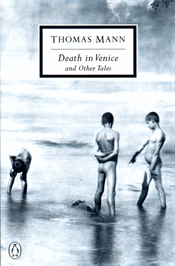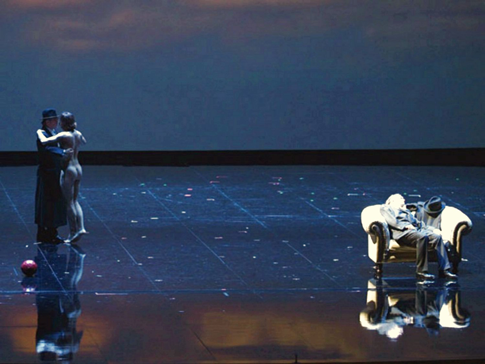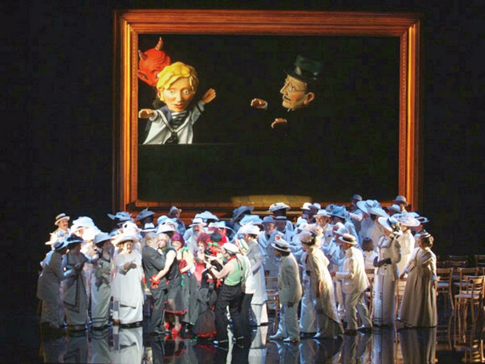
15 Jun 2008
See Venice and then die
For the belated Spanish premiere of Britten’s Death in Venice, 35 years after its creation in Aldeburgh, Barcelona seems a felicitous choice.
English Touring Opera are delighted to announce a season of lyric monodramas to tour nationally from October to December. The season features music for solo singer and piano by Argento, Britten, Tippett and Shostakovich with a bold and inventive approach to making opera during social distancing.
This tenth of ten Live from London concerts was in fact a recorded live performance from California. It was no less enjoyable for that, and it was also uplifting to learn that this wasn’t in fact the ‘last’ LfL event that we will be able to enjoy, courtesy of VOCES8 and their fellow vocal ensembles (more below …).
Ever since Wigmore Hall announced their superb series of autumn concerts, all streamed live and available free of charge, I’d been looking forward to this song recital by Ian Bostridge and Imogen Cooper.
Although Stile Antico’s programme article for their Live from London recital introduced their selection from the many treasures of the English Renaissance in the context of the theological debates and upheavals of the Tudor and Elizabethan years, their performance was more evocative of private chamber music than of public liturgy.
Evidently, face masks don’t stifle appreciative “Bravo!”s. And, reducing audience numbers doesn’t lower the volume of such acclamations. For, the audience at Wigmore Hall gave soprano Elizabeth Llewellyn and pianist Simon Lepper a greatly deserved warm reception and hearty response following this lunchtime recital of late-Romantic song.
For this week’s Live from London vocal recital we moved from the home of VOCES8, St Anne and St Agnes in the City of London, to Kings Place, where The Sixteen - who have been associate artists at the venue for some time - presented a programme of music and words bound together by the theme of ‘reflection’.
'Such is your divine Disposation that both you excellently understand, and royally entertaine the Exercise of Musicke.’
‘And there was war in heaven: Michael and his angels fought against the dragon; and the dragon fought and his angels, And prevailed not; neither was their place found any more in heaven … that old serpent … Satan, which deceiveth the whole world: he was cast out into the earth, and his angels were cast out with him.’
There was never any doubt that the fifth of the twelve Met Stars Live in Concert broadcasts was going to be a palpably intense and vivid event, as well as a musically stunning and theatrically enervating experience.
‘Love’ was the theme for this Live from London performance by Apollo5. Given the complexity and diversity of that human emotion, and Apollo5’s reputation for versatility and diverse repertoire, ranging from Renaissance choral music to jazz, from contemporary classical works to popular song, it was no surprise that their programme spanned 500 years and several musical styles.
The Academy of St Martin in the Fields have titled their autumn series of eight concerts - which are taking place at 5pm and 7.30pm on two Saturdays each month at their home venue in Trafalgar Square, and being filmed for streaming the following Thursday - ‘re:connect’.
The London Symphony Orchestra opened their Autumn 2020 season with a homage to Oliver Knussen, who died at the age of 66 in July 2018. The programme traced a national musical lineage through the twentieth century, from Britten to Knussen, on to Mark-Anthony Turnage, and entwining the LSO and Rattle too.
With the Live from London digital vocal festival entering the second half of the series, the festival’s host, VOCES8, returned to their home at St Annes and St Agnes in the City of London to present a sequence of ‘Choral Dances’ - vocal music inspired by dance, embracing diverse genres from the Renaissance madrigal to swing jazz.
Just a few unison string wriggles from the opening of Mozart’s overture to Le nozze di Figaro are enough to make any opera-lover perch on the edge of their seat, in excited anticipation of the drama in music to come, so there could be no other curtain-raiser for this Gala Concert at the Royal Opera House, the latest instalment from ‘their House’ to ‘our houses’.
"Before the ending of the day, creator of all things, we pray that, with your accustomed mercy, you may watch over us."
The doors at The Metropolitan Opera will not open to live audiences until 2021 at the earliest, and the likelihood of normal operatic life resuming in cities around the world looks but a distant dream at present. But, while we may not be invited from our homes into the opera house for some time yet, with its free daily screenings of past productions and its pay-per-view Met Stars Live in Concert series, the Met continues to bring opera into our homes.
Music-making at this year’s Grange Festival Opera may have fallen silent in June and July, but the country house and extensive grounds of The Grange provided an ideal setting for a weekend of twelve specially conceived ‘promenade’ performances encompassing music and dance.
There’s a “slide of harmony” and “all the bones leave your body at that moment and you collapse to the floor, it’s so extraordinary.”
“Music for a while, shall all your cares beguile.”
The hum of bees rising from myriad scented blooms; gentle strains of birdsong; the cheerful chatter of picnickers beside a still lake; decorous thwacks of leather on willow; song and music floating through the warm evening air.

For the belated Spanish premiere of Britten’s Death in Venice, 35 years after its creation in Aldeburgh, Barcelona seems a felicitous choice.
The 17 scenes in this opera, succeeding at a very tense pace, profited by the Liceu’s sophisticated machinery and lighting equipments to turn the whole into a motion picture, if one unrelated to Luchino Visconti’s award-winning masterpiece Morte a Venezia. Incidentally, the opera and the film share both the same year of first release (1973) and the ominous fame of swan songs of their respective creators, neither of these having survived 1976. At that time, the openly homoerotic charge of Thomas Mann’s original novel (1913) still worked as a stumbling block for mainstream opera-goers, but nowadays the coming-out of respectable old professor von Aschenbach is probably perceived as no big news and definitely not worth such a tragic punishment as death by cholera or, arguably, a “passive” suicide.
Guilt and punishment are such stuff as tragedy is made of. Since the shift in current morals caused feeling of guilt to disappear from the Western public discourse on homosexuality (even less so in Spain, where gay couples are legally allowed to marry), tragicism is no longer an option for staging Death in Venice. Thus director Willy Decker felt bound to pepper the story a bit by adding such hypes as Aschenbach kissing the boy Tadzio on a megascreen or desperately waltzing with him around the stage. True, all that happens as if in a dream, but when the agonizing scholar gets overwhelmed by a heap of naked male bodies choking him to death, one cannot help wondering how counter-heroically all that display of flesh can work, irrespective of the viewer’s sexual leanings. Let’s stop it here, lest both the director and this reviewer be exposed as homophobics in disguise…
The tribute to postmodern commonsense having been paid, Decker felt free to follow the libretto as literally as librettist Myfanwy Piper had done with Mann’s novel. His Venice is a disquieting city peopled by ruffians, gondoliers, porters, whores and peddlers of dubious goods and services, their faces and clothes painted with garish clown-like colors. The hollow cosmopolitan socialites assembling in the Grand Hôtel des Bains at the Lido are their victims, yet Aschenbach cannot sympathize with them either. All he is after is ideal beauty, whether in a Caravaggio painting on display at a museum or in Tadzio’s angelic face. In the end, both images morph in front of his eyes into one nightmarish obsession, while the Gods of Greece — Apollo and Bacchus — fight over his soul with contrasting messages from heaven, as in a mystery play. The sets are gorgeous, with blue skies recalling Magritte and pitch-black waters in realistic movie projections.
 left: Uli Kirsch (Tadzio) [with Aschenbach’s Dopplegänger], right: Hans Schöpflin (Aschenbach)
left: Uli Kirsch (Tadzio) [with Aschenbach’s Dopplegänger], right: Hans Schöpflin (Aschenbach)
The same struggle between life and death breathed from the orchestral pit, mirroring the shifts of wind and tide from the iodine scent of the open sea to the heavy stench of the Lagoon in Summer and back — a common experience for Venice visitors, cleverly described in the libretto. Under Sebastian Weigle’s baton, the taxing score emerged in a glory of harmonies and colors: full-tone scales alternating with polytonalism, piano with Java-style gamelan and far-away echoes of the Baroque. Also the singing company was top-level. The German tenor Hans Schöpflin spun his exquisite mezza voce over the stream of inner monologues and extatic flourishes devised by Britten for his aging mate Peter Pears. Aschenbach’s protean opponent, tempter, flatterer, was the Texan baritone Scott Hendrick, always magnetic throughout his seven so diverse roles. Countertenor Carlos Mena, a reputed Baroque specialist, lent his sunny and mellow alto range to Apollo’s oracles. Within the swarm of cameo roles, particular praise was deserved by the sanguine Begoña Alberdi in the double bill of Strawberry Seller / Newspaper Seller, and by Leigh Melrose, a New Yorker, whose extended narrative solo as The English Clerk in the travel bureau (“In these last years/ The Asiatic cholera has spread/ from the Delta of the Ganges”) conveyed a thrill of Doomsday.
Carlo Vitali
 Death in Venice, Act 2, sc. 10 (The strolling players)
Death in Venice, Act 2, sc. 10 (The strolling players)